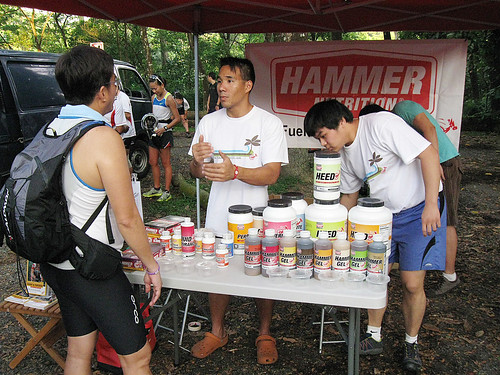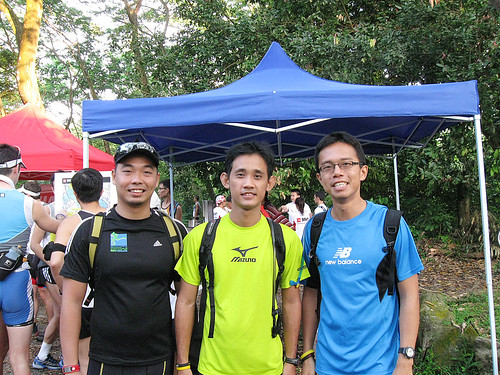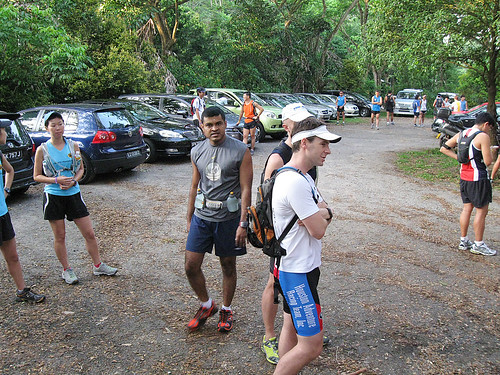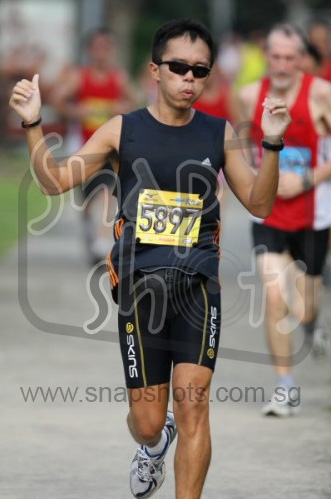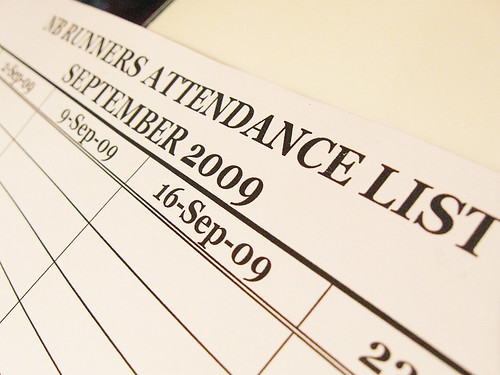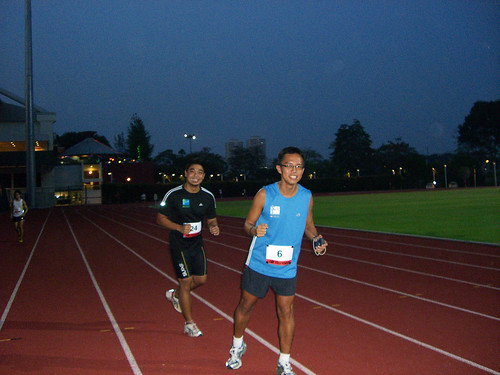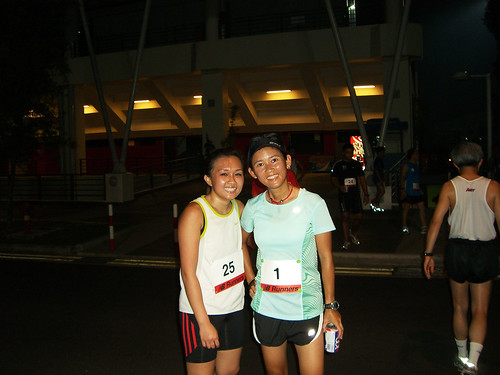http://in.reuters.com/article/lifestyleMolt/idINTRE58F4BQ20090916?sp=true
Wed Sep 16, 2009 11:40pm IST
By Mitch Phillips
LONDON (Reuters Life!) - The hardest thing about my running of this year's London marathon was not hitting the wall after 20 miles but having to endure the "encouragement" of fellow runners and supporters when I started walking after one.
I didn't become possibly the first of 32,000 participants to stop running because I was tired or suffering cramp but because I wanted to minimize both later in the race.
But the fact that walking one minute of every 10 would also help me to a faster time than running all the way was the driving force behind my experiment with the "walk-break" method.
The concept sounds counter-intuitive at least, barmy at worst, but its chief protagonist, American Jeff Galloway, has made a career out of promoting it.
The basic theory is that the key muscles and tendons involved in running get such regeneration from the brief rest afforded during the walk break that you are able to run faster overall than when trying to plod the entire distance.
Instead of joining the mass of cramped, suffering participants forced to walk the last few miles after their bodies have given up, you take you breaks early and often.
With the added mental bonus of breaking the race down into mini-targets of nine minutes, ideally you finish strong and fresh with the not inconsiderable benefit of recovering much more quickly.
Putting it into action though takes some self-discipline. Amid the adrenalin rush of the early stages of a big-city marathon it's not easy to duck onto the path before you've broken sweat, smiling benignly at the bemused onlookers calling out "come on mate, you can do it, only 25 miles to go."
But, having posted a time of three hours 16 minutes - 14 minutes inside my target and finishing with my fastest two kms of the race - I have become such a convert that my friends and club mates have introduced a conversational "Jeff ban" when out running with them.
A self-confessed "very average" runner in his teenage years Galloway improved rapidly enough to represent his country in the 10,000 meters at the 1972 Olympics.
He then concentrated more on the marathon - he has completed more than 120 editions of the classic distance - and coaching.
Author of more than a dozen books, beginning with the huge-selling "Galloway's Book on Running," nowadays he spends his time criss-crossing the United States and beyond giving seminars and motivational speeches (www.jeffgalloway.com).
From advising a few keen runners visiting his running store almost 40 years ago, Galloway, 64, now coaches tens of thousands of athletes via his seminars and the web.
He stumbled across the system that was to define much of his adult life when he began training a group of 22 novice runners in 1973.
"Most of them did a lot of walking in their training and when they all completed their five and 10km target races without any injuries, which was very unusual, I realized that the walking was key, Galloway told Reuters in a telephone interview from his base in Atlanta.
"The method quickly evolved, I developed different ratios for different levels of fitness and different target times. Someone aiming to break three hours can benefit in the same way as somebody just hoping to finish.
"The body is not designed for continuous running for long distances so it is all about the conservation of resources."
Galloway turned Guinea pig when he stopped running competitively and realized he needed a way to continue to be able to enjoy the sport injury-free.
The result of his walk-break approach was a personal best marathon of 2:16 at the age of 35.
"I never doubted that it worked but that strengthened my conviction," he said.
Not everyone thinks Galloway has got it right and there is something of a backlash by some in the sport who scoff at the lack of quantifiable evaluation of his approach and others who consider it somehow "impure" to choose to walk - presumably deeming it acceptable to do so through fatigue at the end.
"There is always going to be skepticism, it's the way of the world, but I'm not forcing anyone to try my method," Galloway said.
"I get around 100 emails a day. About 30 percent are from people with a question and the rest are from satisfied customers."
(Editing by Paul Casciato)
I’m not telling you it is going to be easy — I’m telling you it’s going to be worth it.
Sunday, September 27, 2009
Saturday, September 26, 2009
Friday, September 25, 2009
2009 Formula 1 SingTel Singapore GrandPrix Practice Session 2
Can hear the roaring car engines from my house corridor too.
Saturday, September 19, 2009
Running to the Limit
Excerpts from the book
Paul Tergat: Running to the Limit; His Life and His Training Secrets With Many Tips For Runners
CHAPTER 1: THE DREAM DIDN’T CAME TRUE
In championships there are always winners and losers. When you are into the sports this is something you have to accept.
Plan your races some months in advance. Preparing for a race means not only the physical training, it means also the right mental preparation. When we talk about marathon, we talk about a discipline that is a punishment for your body. If you are not mentally prepared, you will not succeed.
Even when you feel you cannot achieve your goal, never drop of a race. When you drop out once you will do it again.
CHAPTER 2: HOW EVERYTHING BEGAN
Static stretching: After the training, static stretching is recommended for relaxing but not immediately before fast training or competition.
Dynamic stretching: Recommended before fast training or competition.
CHAPTER 3: WITHIN ONE YEAR AT THE TOP
You cannot reach the top without the assistance of others.
Don’t warm up for a long time. Ten minutes of easy jogging and a few dynamic stretching exercises are enough.
Try to run in a comfortable pace form the beginning. Don’t follow others. Most of the runners, even much more experienced ones than you are, begin too fast.
Every person develops a unique and individual running style. Posture and running styles reflect your physique and the feeling you have for your body. When run the way we feel.
Economical running means running with less effort and less energy loss.
CHAPTER 4: KING OF CROSS CROUNTRY AND HALF MARATHON
The main reason the Kenyans have their main training at 10 am is .. “this is the time of the day when you still have a lot of energy. The other point: if you wait till 3 in the afternoon for the hard session, you don’t have enough time for recovery. You cannot train hard, eat and then go to bed.”
Believe me, it is certainly not easy. Natural talent is not enough. .. To achieve something in sport, as in life, you have to work hard every day.
I need to be surrounded by nature and to follow my own nature, to have variety and to never repeat myself.
CHAPTER 5: THE ETERNAL DUELS WITH HAILE
I wanted to prove that I could run very fast on all surfaces.
I always dreamt that one day at one distance I could be able to run faster than any human before me.
CHAPTER 6: NEW CHALLENGE: MARATHON
“I always like to break into new grounds. I never wanted only to compete. I always wanted something special. .. I never believe something is impossible. Only when I try I know if it is possible or not.”
After these five marathons, Tergat knew he was completely inside the marathon. Now he was ready for his master. It was only a question of the right time, the right course, the right weather and the right form.
Marathon is the absolute challenge. It is a passion. It is the mother of all battles. When you go for a marathon, you need to be ready. Everything has to be right. The physical and mental preparation, the food you were eating in the days and before, the drinks you are taking, the pace you choose … it doesn’t matter going to walk, to jog or if you are running as fast as you can. At one point, the whole body is changing and the marathon is starting to eat you. This is the deciding moment, the moment when the whole body is crying and wants to stop and only your mind keeps you going. Maybe the shoe is causing a problem and pinching you, maybe you feel a twitch in your left knee … Don’t worry: even the best runners have these kinds of problems.
But it is not the pain that disturbs you most. It is the self – pity. The mind is becoming exhausted and weak. This is the marathon! Now you have to be strong – and you will, because this is what you have prepared for months or even years. The better your endurance, the better you will handle the problems on the last part of the race.
The readiness in a marathon depends a lot on the mental preparation. I believe in any kind of sport the mental power is at least 50% of a performance. In my case, I would say only one quarter is the physical aspect, three quarters concern the mental part. When you are running a marathon, you fight with so many things: with the competitors or your personal weaknesses, the weather and the distance. The 42.195km is a challenge for everybody, even if you are the World Record holder in the half – marathon. After finishing a marathon even I have sores. I have the problem of walking, going down stairs.
At the start of the marathon, you have to believe in yourself. You have to believe in your training. You have to believe in your ability. This belief makes the difference between two athletes who were following the same training program. I think the mental sphere is also a question of the personality. Some of us can bear more pain or suffering than others.
It is not the one who eats a lot who can increase his performance but the one who eats right.
CHAPTER 7: DOCTOR ROSA’S SECRETS
Be patient.
You have to use glycogen economically and burn fat, too. Your body will learn how to burn fat only after a lot of long runs.
Train yourself to enjoy yourself and to improve your physical shape.
CHAPTER 8: CROWNING IN BERLIN
I never believe something is impossible before I try.
This is the mother of running.
Never think something is impossible before you try. When you say it is impossible, that leans you have given up already.
Never blame your surroundings when you are not able to reach your goals. It is not your background that counts but what you make out of your life. Your destiny lies in your hands.
CHAPTER 9: THE FAMILY AND BUSINESS MAN
“Religiously,” is how he calls it. “I need to run. Running is in my blood. I am born to run.”
CHAPTER 10: MISCELLANEOUS
“ .. try to run by listening inside you. It gives you greater joy when you run in harmony with nature.”
“It is really very, very important for any runner to have a long term planning. You have to know maybe half a year in advance when you are going to run your first half marathon or marathon. It is important to have a target in your daily training. It is easier to follow a certain training program when you know exactly what you are training for.”
“I believe that even for the one who wants to break the four hours barrier in the marathon the mental preparation is essential. Marathon is very challenging for everyone. Irrespective of what kind of character you are, in marathon you have to be patient. At the same time, you have to be prepared for what might happen on the way, you have to be ready physically and mentally when you stand at the starting line and you have to focus fully on the 42.195km to come.”
Paul Tergat: Running to the Limit; His Life and His Training Secrets With Many Tips For Runners
CHAPTER 1: THE DREAM DIDN’T CAME TRUE
In championships there are always winners and losers. When you are into the sports this is something you have to accept.
Plan your races some months in advance. Preparing for a race means not only the physical training, it means also the right mental preparation. When we talk about marathon, we talk about a discipline that is a punishment for your body. If you are not mentally prepared, you will not succeed.
Even when you feel you cannot achieve your goal, never drop of a race. When you drop out once you will do it again.
CHAPTER 2: HOW EVERYTHING BEGAN
Static stretching: After the training, static stretching is recommended for relaxing but not immediately before fast training or competition.
Dynamic stretching: Recommended before fast training or competition.
CHAPTER 3: WITHIN ONE YEAR AT THE TOP
You cannot reach the top without the assistance of others.
Don’t warm up for a long time. Ten minutes of easy jogging and a few dynamic stretching exercises are enough.
Try to run in a comfortable pace form the beginning. Don’t follow others. Most of the runners, even much more experienced ones than you are, begin too fast.
Every person develops a unique and individual running style. Posture and running styles reflect your physique and the feeling you have for your body. When run the way we feel.
Economical running means running with less effort and less energy loss.
CHAPTER 4: KING OF CROSS CROUNTRY AND HALF MARATHON
The main reason the Kenyans have their main training at 10 am is .. “this is the time of the day when you still have a lot of energy. The other point: if you wait till 3 in the afternoon for the hard session, you don’t have enough time for recovery. You cannot train hard, eat and then go to bed.”
Believe me, it is certainly not easy. Natural talent is not enough. .. To achieve something in sport, as in life, you have to work hard every day.
I need to be surrounded by nature and to follow my own nature, to have variety and to never repeat myself.
CHAPTER 5: THE ETERNAL DUELS WITH HAILE
I wanted to prove that I could run very fast on all surfaces.
I always dreamt that one day at one distance I could be able to run faster than any human before me.
CHAPTER 6: NEW CHALLENGE: MARATHON
“I always like to break into new grounds. I never wanted only to compete. I always wanted something special. .. I never believe something is impossible. Only when I try I know if it is possible or not.”
After these five marathons, Tergat knew he was completely inside the marathon. Now he was ready for his master. It was only a question of the right time, the right course, the right weather and the right form.
Marathon is the absolute challenge. It is a passion. It is the mother of all battles. When you go for a marathon, you need to be ready. Everything has to be right. The physical and mental preparation, the food you were eating in the days and before, the drinks you are taking, the pace you choose … it doesn’t matter going to walk, to jog or if you are running as fast as you can. At one point, the whole body is changing and the marathon is starting to eat you. This is the deciding moment, the moment when the whole body is crying and wants to stop and only your mind keeps you going. Maybe the shoe is causing a problem and pinching you, maybe you feel a twitch in your left knee … Don’t worry: even the best runners have these kinds of problems.
But it is not the pain that disturbs you most. It is the self – pity. The mind is becoming exhausted and weak. This is the marathon! Now you have to be strong – and you will, because this is what you have prepared for months or even years. The better your endurance, the better you will handle the problems on the last part of the race.
The readiness in a marathon depends a lot on the mental preparation. I believe in any kind of sport the mental power is at least 50% of a performance. In my case, I would say only one quarter is the physical aspect, three quarters concern the mental part. When you are running a marathon, you fight with so many things: with the competitors or your personal weaknesses, the weather and the distance. The 42.195km is a challenge for everybody, even if you are the World Record holder in the half – marathon. After finishing a marathon even I have sores. I have the problem of walking, going down stairs.
At the start of the marathon, you have to believe in yourself. You have to believe in your training. You have to believe in your ability. This belief makes the difference between two athletes who were following the same training program. I think the mental sphere is also a question of the personality. Some of us can bear more pain or suffering than others.
It is not the one who eats a lot who can increase his performance but the one who eats right.
CHAPTER 7: DOCTOR ROSA’S SECRETS
Be patient.
You have to use glycogen economically and burn fat, too. Your body will learn how to burn fat only after a lot of long runs.
Train yourself to enjoy yourself and to improve your physical shape.
CHAPTER 8: CROWNING IN BERLIN
I never believe something is impossible before I try.
This is the mother of running.
Never think something is impossible before you try. When you say it is impossible, that leans you have given up already.
Never blame your surroundings when you are not able to reach your goals. It is not your background that counts but what you make out of your life. Your destiny lies in your hands.
CHAPTER 9: THE FAMILY AND BUSINESS MAN
“Religiously,” is how he calls it. “I need to run. Running is in my blood. I am born to run.”
CHAPTER 10: MISCELLANEOUS
“ .. try to run by listening inside you. It gives you greater joy when you run in harmony with nature.”
“It is really very, very important for any runner to have a long term planning. You have to know maybe half a year in advance when you are going to run your first half marathon or marathon. It is important to have a target in your daily training. It is easier to follow a certain training program when you know exactly what you are training for.”
“I believe that even for the one who wants to break the four hours barrier in the marathon the mental preparation is essential. Marathon is very challenging for everyone. Irrespective of what kind of character you are, in marathon you have to be patient. At the same time, you have to be prepared for what might happen on the way, you have to be ready physically and mentally when you stand at the starting line and you have to focus fully on the 42.195km to come.”
Wednesday, September 16, 2009
Sunday, September 13, 2009
Wednesday, September 09, 2009
Sunday, September 06, 2009
Tuesday, September 01, 2009
Subscribe to:
Posts (Atom)



